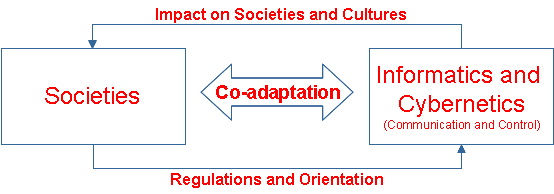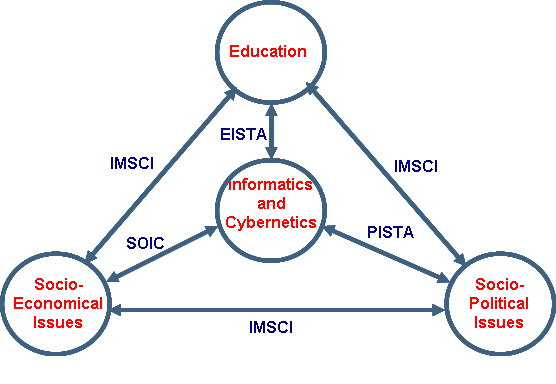Informatics and Cybernetics (communication and control) are having an increasing impact on societies and in the globalization process that is integrating them. Societies are trying to regulate this impact, and adapt it to their respective cultural infra-structures. Societies and cultures are in reciprocal co-adaptations with Information and Communication Technologies. Synergic relationships might emerge in this co-adaptation process by means of positive and negative feedback loops, as well as feedforward ones. This would make the whole larger than the sum of its parts, generating emergent properties in the parts involved as well as in the whole coming forth. The academic, private, and public sectors are integrating their activities; multi-disciplinary groups and inter-disciplinary teams are being formed, and collaborative research and development projects are being organized in order to facilitate and adequately orient the design and implementation of the feedback and the feedforward loops, so the synergic relationships are socially positive and personally human.

Purpose
One of the main purposes of the International Multi-Conference on Society, Cybernetics and Informatics: IMSCI 2025, is to bring together academics, professionals, and managers from the private and the public sectors, so they can share ideas, results of research, and innovative services or products, in a multi-disciplinary and multi-sector forum.
Educational technologies, socio-economic organizations, and socio-political processes are essential domains among those involved in the evolving co-adaptation and co-transformation between societies and cultures on the one hand, and between informatics and cybernetics (communication and control) on the other hand. Consequently, the principal conferences in the context of the IMSCI 2025 Multi-Conference are the following:
-
12th International Conference on Education and Information Systems, Technologies and Applications: EISTA 2025
-
Special Track on Social and Organizational Informatics and Cybernetics: SOIC 2025
-
Special Track on Politics and Information Systems, Technologies and Applications: PISTA 2025
These three conferences are related to each other, and, as a whole, are producing or might produce synergic relationships with the Information and Communication Technologies. This is why the Organizing Committees of the three of them have the purpose of combining their efforts in a way that would lead to the organization of an adequate joint event, where academics, researchers, consultants, professionals, innovators, and practitioners from the three areas might relate and interact with each other in the same event. This kind of interactions might generate possibilities of cross-fertilization and analogical thinking, as well as possibilities of new working hypothesis, ideas, and reflections on the impact, importance, and usefulness of Informatics and Cybernetics in important dimensions of educational, socio-political, and socio-economical processes, services, and products. A visualization of these potential synergic relationships is visualized in the next picture.

Organizational, Reviewing, and Selection of Best Papers Policies
Technical Keynote Speakers
Technical keynote speakers will be selected from early submissions because this selection requires an additional evaluation according to the quality of the paper, assessed by its reviewers, the authors' CV and the paper's topic.
Virtual Pre- and Post-Conference Sessions
Face-to-face sessions of all events will have associated virtual pre- and post-conference sessions where registered participants can comment each paper in a forum associated to it. Registered participant at any event will have a password to access any virtual session of any collocated event.
Reviewing Process
All Submitted papers/abstracts will go through three reviewing processes: (1) double-blind (at least three reviewers), (2) non-blind, and (3) participative peer reviews. Final acceptance depends of the three kinds of reviews but a paper should be recommended by non-blind reviewers AND blind reviewers in order to be accepted for presentation at the conference and to be included in the respective conference proceedings. A recommendation to accept made by non-blind reviewers is a necessary condition, but it is not a sufficient one. A submission, to be accepted, should also have a majority of its double-blind reviewers recommending its acceptance. This double necessary conditions generate a more reliable and rigorous reviewing than a those reviewing methods based on just one of the indicated methods, or just on the traditional double-blind reviewing. More details regarding this issue can be found at https://www.iiis.org/iiis/PeerReviewing.asp.
The three kinds of reviews mentioned above will support the selection process of those papers/abstracts that will be accepted for their presentation at the conference, as well as those to be selected for their publication in JSCI Journal. Details regarding the Acceptance Policy can be found at https://www.iiis.org/iiis/AcceptancePolicy.asp.
Authors of accepted papers who registered in the conference can have access to the evaluations and possible feedback provided by the reviewers who recommended the acceptance of their papers/abstracts, so they can accordingly improve the final version of their papers. Non-registered authors will not have access to the reviews of their respective submissions.
Virtual Participation
Submissions for Face-to-Face or for Virtual Participation are both accepted. Both kinds of submissions will have the same reviewing process and the accepted papers will be included in the same proceedings.
Pre-Conference and Post-conference Virtual sessions (via electronic forums) will be held for each session included in the conference program, so that sessions papers can be read before the conference, and authors presenting at the same session can interact three days before and during the conference, as well as up to three weeks after the conference is over. Authors can also participate in peer-to-peer reviewing in virtual sessions.
Invited Sessions Organizers
Registration fees of an effective invited session organizers will be waived according to the policy described in the web page (click on 'Invited Session', then on 'Benefits for the Organizers of Invited Sessions'), where you can get information about the ten benefits for an invited session organizer. To propose the organization of an Invited Session, please visit the conference website, and go to the menu option “Invited Sessions” and then to the menu sub-option “Invited Sessions Organizers.”
Best Papers
Authors of the best 25%-30% of the papers presented at the conference (included those virtually presented) will be invited to adapt their papers for their publication in the Journal of Systemics, Cybernetics and Informatics.
One best paper of each session included in the program will be selected by the respective session’s co-chairs after consulting with the session’s audience. Invited Sessions organizers will select the best paper of the session they organized. If there is a tie in a given session, the paper that will be selected as the best session’s paper will be the one which have had the highest quantitative evaluations average according to its double-blind and non-blind reviews.
The selection process of the best 25%-30%, to be also published in the Journal, will be based on the sessions' best papers and the quantitative evaluation average made by its anonymous and non-anonymous reviewers. The later will be applied to papers which acceptance was based on reviews made to draft papers. Reviews of abstracts and extended abstracts will not be valid for selecting best papers according to the quantitative evaluation of the respective submissions.

